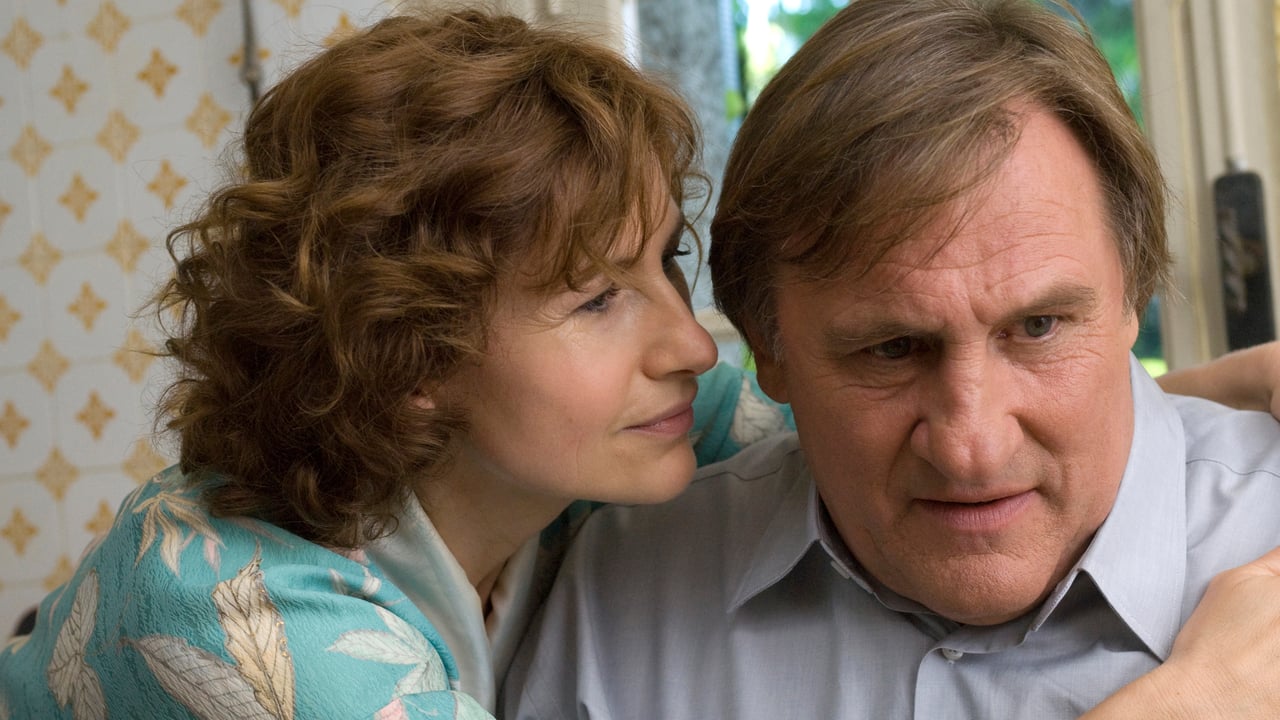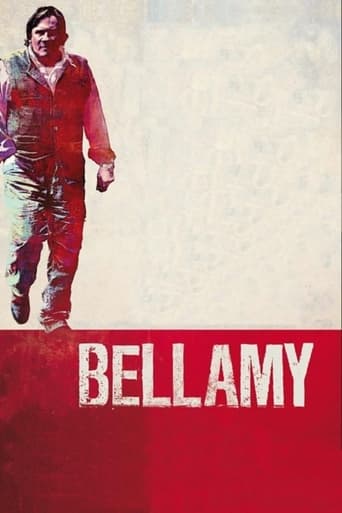

People are voting emotionally.
... View MoreVery interesting film. Was caught on the premise when seeing the trailer but unsure as to what the outcome would be for the showing. As it turns out, it was a very good film.
... View MoreI didn’t really have many expectations going into the movie (good or bad), but I actually really enjoyed it. I really liked the characters and the banter between them.
... View MoreActress is magnificent and exudes a hypnotic screen presence in this affecting drama.
... View MoreBellamy (Depardieu) is a famous Parisian police detective on vacation in Nimes with his wife. He is intrigued by a local scandal involving an insurance scam and death. The perpetrator of the scam contacts Bellamy for his advice.His curiosity is roused and he meets the con.I agree with the reviewer who said this slow moving boring film has a bunch of subplots that never seem to go any where. I would add the film tries to be deep with tons of meaning of life dialogue. This mixture comes off as vapid.I suppose the main subplot concerned Bellamy's (Depardieu) brother Jacques (Clovis Cornillac) who is miscast at 20 years younger than Depardieu. In the end we find out that Bellamy almost choked him to death as a child. So? Look this movie is a dud. Even with the tantalizing evidence of a twist ending of sorts. It is too vapid = a non suspenseful non thriller non anything waste of time.Also Depardieu's naughty sexual behavior towards his wife is a pathetic prop to add virility to this fading obese star. Depardieu is also portrayed as a sort of a walking Socrates plum full of contemplative dialogues--the worst sort of French film flaw---talk talk talk talk.... Do not rent or watch this film.
... View MoreHow do you face the loss of a loved one bent on self-destruction? That's the real theme of this movie, mistakenly packaged as a crime thriller.In the midst of his idyllic summer vacation, Inspector Bellamy and his adoring wife are joined by his dissipated, no-good, yet charismatic brother (a haunting performance from my favorite French actor, Clovis Cornillac). Meanwhile, the inspector is drawn into a case that ultimately holds up a mirror to his own dilemma: how do you deal with the self-destruction of someone you love?If you've ever faced this in your own life--the descent of a relative or lover drawn into drugs, crime, or madness--you know the feelings of helplessness, guilt and grief that can linger for a lifetime. In the midst and aftermath of the crisis, how do you cope? Do you fall into the fallacy of imagining that you change another human being? Do you turn your back on them? Or...do you construct a comforting fantasy that will give you peace of mind?The latter is the choice of just about everyone in the "murder mystery" part of this movie. Never mind the wanted man put on trial; the story is really about the homeless vagabond who died in his place, and the woman who loved him, the clerk named Claire Bonheur who works at the home improvement store. She and the homeless man were lovers for five years. Bonheur is still so torn up about his descent that she can't even bear to let Bellamy look at her photo album. Now the man is dead, perhaps murdered by a con man who took advantage of him. But when Bellamy (conned by the con) puts the idea in her head that her homeless ex-lover may have died by choice, Bonheur seizes on it, and even finds a lawyer to put forth the argument. This is her way of bearing the unbearable: she chooses to believe that her ex-lover died because he wanted to. It's a fantasy; he was murdered. But this is how she copes. (Bonheur = happiness, and she will believe whatever is necessary to escape her sadness.) Only when the trial is over, and Bellamy sees all the parties on TV--the smiling Bonheur and the ambitious young lawyer, the con and his accomplice who've gotten away with murder--does Bellamy realize the awful, awful truth.All this is only a mirror held up to Bellamy's own personal dilemma, the situation with his wastrel brother. Bellamy loves him, but cannot abide his self-destructive behavior. This has been going on a long time; we learn that Bellamy tried to throttle his brother when they were children, and for that act he has ever after felt guilty. He wants to save his brother; as Bellamy says of himself, "a good cop is a good Samaritan." (Good Samaritan = good friend = bel ami = Bellamy.) But ultimately, you cannot save those bent on destroying themselves, no matter how much you love them. How to bear this painful truth? At the end of the movie, Bellamy's dilemma is just beginning.Another work that deals with this theme (going along with a con because believing a lie is more bearable than the truth) is a great story by Ruth Rendell, "The Strawberry Tree," which was also filmed for TV as part of the series "Ruth Rendell Mysteries." Chabrol adapted at least one Rendell novel, and I wonder if he was not influenced by her in this movie.This is a very subtle film that wormed its way into my dreams. Farewell, Chabrol!
... View MoreUnlike in most frantic American crime stories, France's Inspector Bellamy leisurely rambles about its characters as if they were the story, not the crime. And indeed they are: Inspector Paul Bellamy (Gerard Depardieu) is as uncomfortable with the crime subject's different personas as he is with his own past, most notably with his half-brother, Jacques Lebas (Clovie Cornillac), who shows up to renew their sibling rivalry."French Hitchcock" director Claude Chabrol selects each shot for its maximum information, frequently illuminating more than one character, more than one motive. For the French, the highest incentive for crime or a happy life seems to be love, and Chabrol explores the various twists infidelity and family can toss into the crime solving mix. True to his New Wave roots, Chabrol lards each image with meaning while couching the story in a languid realism, less edgy now than years ago, but still full of life's ironies while life is lived out in an almost mundane fashion.More interesting than the multiple personalities of the suspect is the intimate dance of the hero, Bellamy, and his attractive wife, Francoise (Marie Bunel), who provides him with intellectual companionship, sexual longing, and a bit of jealousy for good measure. The lovely chemistry between Depardieu and Bunel reminds me of how authentic a good character study like this can be in the hands of a master director. While Depardieu has developed a belly beyond reason, he still delivers the emotional goods, just as retired Inspector Bellamy can successfully solve a crime. Imagine all this richness without discernible CGI. For good reason: The emphasis is on the husband-wife relationship, not the crime. So it is in most European cinema, or at least it seems that way to an American critic who has seen enough of his country's gadget-centered films.
... View MoreClaude Chabrol (24 June 1930 - 12 September 2010) was one of the French mainstream New Wave film directors, celebrated for his suspense thrillers. BELLAMY is his last film and as such will probably remain one of his more fascinating. he was able to take what appeared on the surface to be rather mundane characters and story threads and twist them and turn them into fascinating tales. This trait is very evident in the mesmerizing, seemingly off the cuff film BELLAMY which holds our attention in a friendly conversational kind of way and then turns the tables at the end, leaving the viewer with the question 'why didn't I see that coming?' Famous Parisian Inspector Paul Bellamy (Gérard Depardieu) and his wife Françoise (Marie Bunel) are enjoying their vacation in Françoise's childhood home in Nîmes, France when they notice a stalker. The stalker calls Bellamy to meet him: Noël Gentil (Jacques Gambin) confesses a murder he has committed and for some reason captures the attention of Bellamy. The 'murder' is an insurance scheme in which Noël staged his own death using a proxy in order to get his wife's life insurance money allowing him to run away with his girlfriend Nadia Sancho (Vahina Giocante). 'Noël Gentil' is actually Emile Leullet married to Madame Leullet (Adrienne Pauly) but after the staged car-over-the-cliff accident, a car supposedly containing a street person Denis Leprince - also played by Gambin, the scam is squelched by the insurance company's investigation. Bellamy covers every lead into this strange situation and it ends with a surprise death that alters the entire scam. Meanwhile Bellamy's restless and resentful brother Jacques (Clovis Cornillac), an ex-con who still manages to steal from friends and puts the blame on his brother, visits Bellamy and his wife, and causes disruptions in their personal life as well as bringing Bellamy to a point of facing secrets about his childhood he has hidden from the world, secrets about his brother that are resolved in a very bizarre manner. All of these facts are ingredients for a thriller of a movie, but Chabrol's technique is to treat the harsh realities of the story as mere chatty conversations. All is not as it seems and behind every thread of this episodically related story are other stories that need the viewer's concentration to resolve. The cast is strong and the jewel of the film is the performance by Marie Bunel as the loving, affectionate, older wife. She glows. It is sad that Claude Chabrol is gone, but his fine movies are a legacy that makes him immortal. Grady Harp
... View More